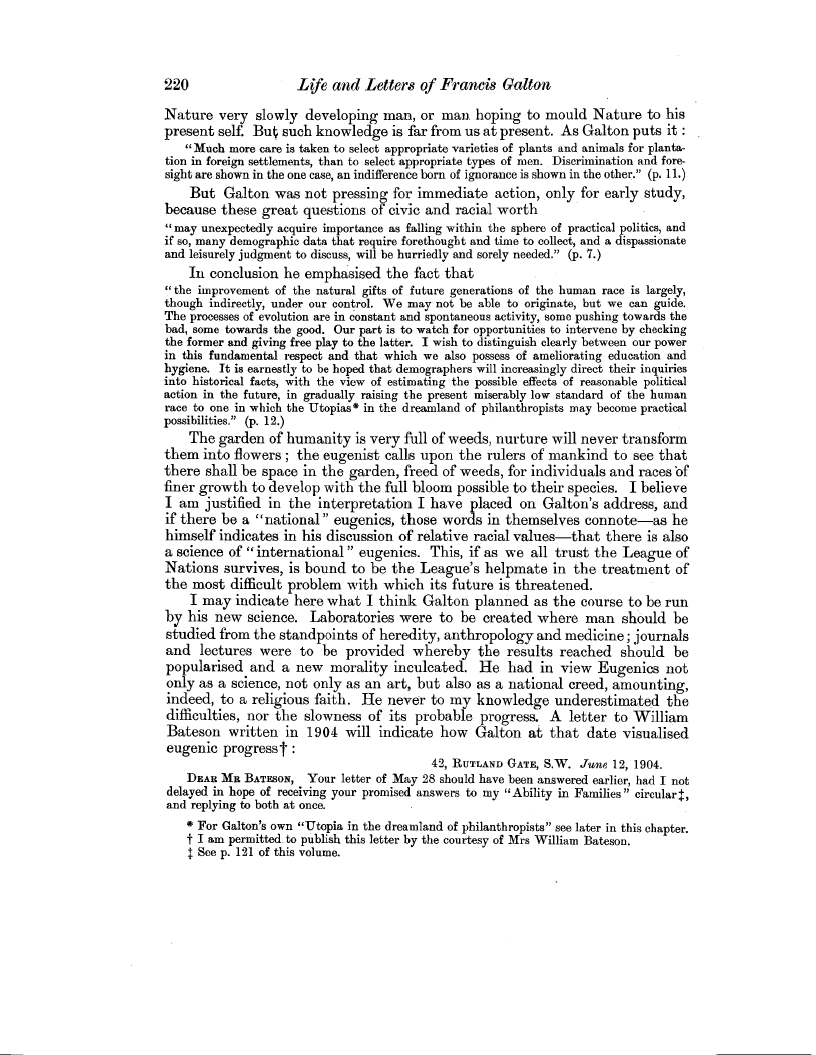| ||||||

OCR Rendition - approximate
220 Life and Letters of Francis Galton Nature very slowly developing man, or man. hoping to mould Nature to his present self. But, such knowledge is far from us at present. As Galton puts it "Much more care is taken to select appropriate varieties of plants and animals for plantation in foreign settlements, than to select appropriate types of men. Discrimination and foresight are shown in the one case, an indifference born of ignorance is shown in the other." (p. 11.) But Galton was not pressing for immediate action, only for early study, because these great questions of civic and racial worth "may unexpectedly acquire importance as falling within the sphere of practical politics, and if so, many demographic data that require forethought and time to collect, and a dispassionate and leisurely judgment to discuss, will be hurriedly and sorely needed." (p. 7.) In conclusion he emphasised the fact that "the improvement of the natural gifts of future generations of the human race is largely, though indirectly, under our control. We may not be able to originate, but we can guide. The processes of evolution are in constant and spontaneous activity, some pushing towards the bad, some towards the good. Our part is to watch for opportunities to intervene by checking the former and giving free play to the latter. I wish to distinguish clearly between our power in this fundamental respect and that which we also possess of ameliorating education and hygiene. It is earnestly to be hoped that demographers will increasingly direct their inquiries into historical facts, with the view of estimating the possible effects of reasonable political action in the future, in gradually raising the present miserably low standard of the human race to one in which the Utopias* in the dreamland of philanthropists may become practical possibilities." (p. 12.) The garden of humanity is very full of weeds, nurture will never transform them into flowers ; the eugenist calls upon the rulers of mankind to see that there shall be space in the garden, freed of weeds, for individuals and races of finer growth to develop with the full bloom possible to their species. I believe I am justified in the interpretation I have placed on Galton's address, and if there be a "national" eugenics, those words in themselves connote-as he himself indicates in his discussion of relative racial values-that there is also a science of " international " eugenics. This, if as we all trust the League of Nations survives, is bound to be the League's helpmate in the treatment of the most difficult problem with which its future is threatened. I may indicate here what I think Galton planned as the course to be run by his new science. Laboratories were to be created where man should be studied from the standpoints of heredity, anthropology and medicine; journals and lectures were to be provided whereby the results reached should be popularised and a new morality inculcated. He had in view Eugenics not only as a science, not only as an art, but also as a national creed, amounting, indeed, to a religious faith. He never to my knowledge underestimated the difficulties, nor the slowness of its probable progress. A letter to William Bateson written in 1904 will indicate how Galton at that date visualised eugenic progress t 42, RUTLAND GATE, S.W. June 12, 1904. DEAR MR BATESON, Your letter of May 28 should have been answered earlier, had I not delayed in hope of receiving your promised answers to my "Ability in Families" circular*, and replying to both at once. For Galton's own "Utopia in the dreamland of philanthropists" see later in this chapter. f I am permitted-to publish this letter by the courtesy of Mrs William Bateson. $ See p. 121 of this volume.
|